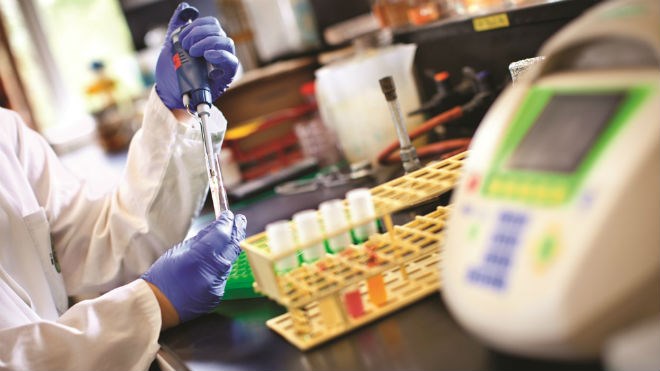Health Sciences North is one of only two hospitals in Ontario that routinely uses its genetic sequencers for clinical use.
The hospital has two next-generation genetic sequencers it uses primarily to detect common cancers -- lung, breast, colon, leukemia and lymphoma – while most hospitals use their sequencers mainly for research.
Dr. Rebecca McClure, a molecular pathologist at Health Sciences North, believes the hospital has the potential to be a leader in the rapidly growing field of genetic testing.
While McClure is not interested in having too many genetic samples shipped to Health Sciences for testing – as many clinics and hospitals already do – she said there is potential for the hospital to provide expertise on intellectual development and creating new processes for interpreting genetic data.
But the true potential for genetic testing, she said, is to create treatments tailored for each individual.
“If I get an illness and go in for therapy, I don't want to take a toxic drug just because it works in most people, and we don't even know how it works,” McClure said. “I would much rather know for sure that there's something available that can target my problem.”
She said it's always best for patients to have as much information as possible about their own health, and genetic testing can help people make the best choices for their health.
Corporations have jumped on genetic testing, McClure said, making it the new multi-billion dollar industry.
One of the world's biggest firms in the sector, 23andMe, gets its customers to spit in a vial to provide a genetic sample. With that sample – and a very detailed medical questionnaire – the company can determine a person's relative risk for certain diseases, and provide some genealogy information.
23andMe also owns the world's largest database of genetic sequences.
“The company has gotten its customers to pay them to conduct the biggest ongoing genetic research study ever done, without needing to apply for government funding, or going through an ethics board, or paying the participants,” McClure said.
Because 23andMe is a private company, McClure said hospitals, universities and public health authorities would need to pay top dollar to access its database.
But a 23andMe spokesperson said the company must go through ethics boards in the United States and Canada. While there is a fee to access 23andMe's database, the company said it has also conducted research with universities and other researchers at no charge.
McClure said legislation around genetic testing has struggled to keep up with advances in the field – which have progressed at break-neck speed in recent years.
The Ministry of Health and Long Term care, for example, does not allow hospitals to test genetic samples if they were taken outside of a hospital – in a clinic for example.
McClure said a company in Brampton has a monopoly on genetic tests from outside hospitals, and charges a premium for those tests because of its position.
“I don't think there should be any bias towards one lab or another,” she said.
The darker side of the issue was also a topic of discussion during the presentation, which was hosted by the Sudbury Chamber of Commerce. Some audience members raised concerns around the dark side of genetic testing – concerns raised by science fiction films like "Gattaca."
Those works depict dystopias where a person's genetic traits determines their future. The moment you are born, doctors can determine if you'll be the next great athlete, or if you'll be destined to a life of hard labour.
“Science fiction has an eerie way of coming true,” McClure said. “I just hope that common sense and goodness prevails."
Join Sudbury.com+
- Messages
- Post a Listing
- Your Listings
- Your Profile
- Your Subscriptions
- Your Likes
- Your Business
- Support Local News
- Payment History
Sudbury.com+ members
Already a +member?
Not a +member?
Sign up for a Sudbury.com+ account for instant access to upcoming contests, local offers, auctions and so much more.
